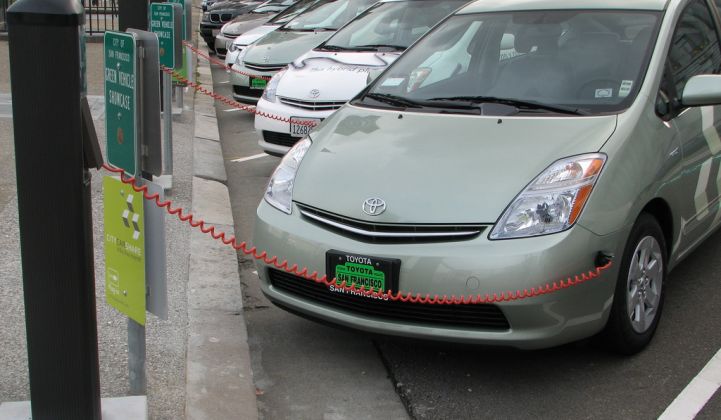Coulomb Technologies has raised $47.5 million in a Series D round to boost its car-charging plans, and has brought in a new investor: Toyota Tsusho Corp., the trading arm of the Japanese automotive giant. Looks like the war over plug-in EV charging infrastructure investment dollars, and strategic partnerships, is about to heat up.
Braemar Energy Ventures and Kleiner Perkins Caufield & Byers led the financing, along with Toyota Tsusho and existing investors Rho Ventures, Voyager Capital, Siemens Venture Capital GmbH, Harbor Pacific Capital Partners and Hartford Ventures. The Campbell, Calif.-based startup has previously raised about $33 million, along with a $15 million federal grant, meaning that the new investment nearly doubles its previous funding.
That’s a lot of money from big-name investors to raise in today’s depressed greentech investment climate. But it’s also a testament to the cost of trying to build a vehicle-fueling infrastructure from scratch. Coulomb, which is working with the likes of Nissan, BMW, Ford, General Motors and Fisker, plans to deploy 5,000 charging stations in the next few years, and had shipped 2,400 of them as of April.
Coulomb’s ChargePoint Network consists of its charging stations and the networking and software smarts to run them. Competitors include ECOtality, Better Place, AeroVironment and other startups, as well as efforts by giants including General Electric, Siemens, Schneider Electric and ABB, and of course, the big Japanese, European and U.S. automakers.
Deep-pocketed partners will be critical for startups like Coulomb, since the upfront costs of putting in chargers for a fleet of plug-in hybrids and EVs that don’t yet exist will be pretty high. Almost all of today’s plug-in charging installations have been done as government-funded partnerships (or settlements, in the case of California), although NRG Energy has promised a subscription-based, private charging network.
With plug-in hybrid and EV sales still lingering in the tens of thousands of vehicles globally, there’s also the question of who’s going to use the charging stations. Fleet vehicles for corporate and government customers have been the primary way we’ve seen chargers deployed en masse to date.
Still, someday we’ll want to drive our plug-in cars from one utility jurisdiction to another, topping off the batteries as we go. Building a network and platform to manage that kind of agnostic charging business is what Coulomb, ECOtality and its startup competitors have based their value on.
That’s led to partnerships with power giants in which the startup’s software may be put to the test in large-scale deployments, such as ECOtality’s licensing agreement with ABB, or Coulomb’s marketing agreement with Siemens, or AeroVironment's partnership with Nissan.
Just when we’ll see enough plug-in vehicles on the road to test the capabilities of these chargers is anyone’s guess. While the Department of Energy sticks to its goal of supporting 1 million plug-ins by 2015, most market projections don’t see the market heating up nearly that fast.



